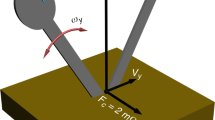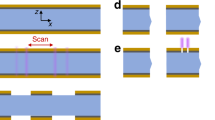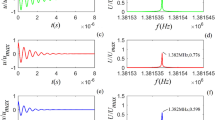Abstract
IT is probable that in the field of use of quartz crystal vibrators there are no requirements more exacting than those imposed on the quartz vibrator which is used to control the time-keeping of a quartz clock. The British Post Office has had considerable experience in fabricating 100 kc./s. quartz vibrators and incorporating them in suitable oscillator circuits to maintain clocks or frequency standards. It is the general experience that these oscillators have a slow frequency change even after several months of uninterrupted operation. This change is extremely small, being of the order of one part in 109 a day for a good clock to one part in 1011 for the best clock. Recent tests have shown that the frequency-change or ‘ageing’ can be reduced by using the crystal vibrator at a temperature which is lower than the normal 50° C.
This is a preview of subscription content, access via your institution
Access options
Subscribe to this journal
Receive 51 print issues and online access
$199.00 per year
only $3.90 per issue
Buy this article
- Purchase on Springer Link
- Instant access to full article PDF
Prices may be subject to local taxes which are calculated during checkout
Similar content being viewed by others
Author information
Authors and Affiliations
Rights and permissions
About this article
Cite this article
MITCHELL, H. Ageing of Quartz Crystal Vibrators. Nature 174, 41–42 (1954). https://doi.org/10.1038/174041b0
Issue Date:
DOI: https://doi.org/10.1038/174041b0
Comments
By submitting a comment you agree to abide by our Terms and Community Guidelines. If you find something abusive or that does not comply with our terms or guidelines please flag it as inappropriate.



